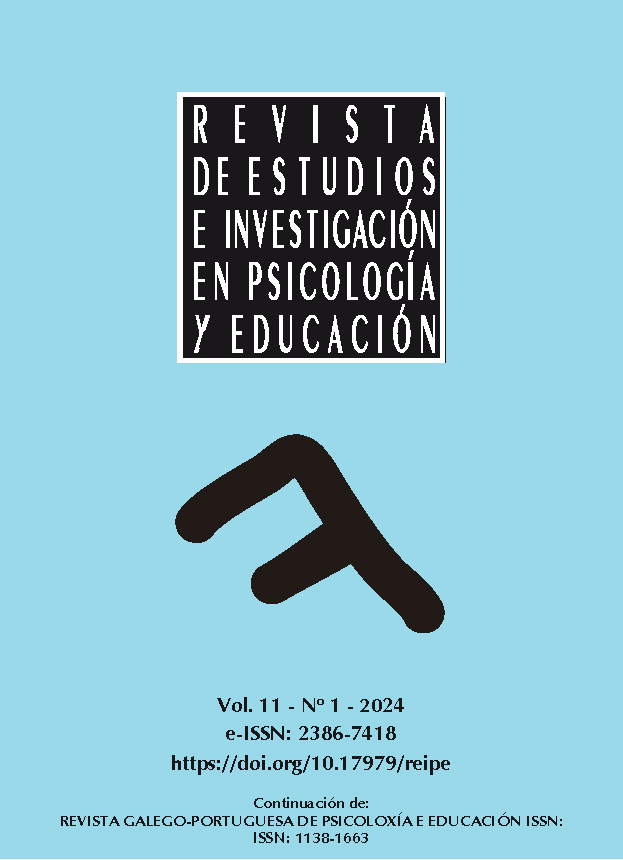Percepciones de los estudiantes de secundaria sobre el modelo flipped classroom en un contexto en línea
Contenido principal del artículo
Resumen
Durante la pandemia, el modelo de aula invertida (flipped classroom model - FCM) totalmente en línea se convirtió en una alternativa al FCM híbrido. Para evaluar la aplicación del FCM en un contexto en línea, se llevó a cabo un estudio de investigación-acción con estudiantes de secundaria portugueses que combinaba clases asíncronas y síncronas. El diseño de las clases se basó en el Modelo 5E: Engage, Explore, Explain, Elaborate and Evaluate. Los datos se recogieron mediante un cuestionario y las interacciones de los/as estudiantes en las actividades sincrónicas. Los resultados muestran que las lecciones asíncronas estimularon el interés de los estudiantes por el tema (Engage), permitiéndoles adquirir una comprensión inicial del mismo (Explore) y demostrar el aprendizaje adquirido (Explain). Las clases sincrónicas pusieron de relieve el papel activo del alumnado en la resolución de problemas complejos en grupo y en la ampliación del aprendizaje autónomo (Elaborate y Evaluate). Sin embargo, en el proceso de ampliación de su aprendizaje, se observó que los/as estudiantes confiaban más en la retroalimentación inmediata del profesorado que en la de sus compañeros/as. Los resultados del estudio confirman que el FCM se adecua al entorno en línea y fomenta la personalización del aprendizaje personalizado y la autonomía del alumnado.
Palabras clave:
Descargas
Detalles del artículo
Citas
ARAGON, Steven; & JOHNSON, Elaine (2008). Factors Influencing Completion and Noncompletion of Community College Online Courses. American Journal of Distance Education, 22(3), 146-158. https://doi.org/10.1080/08923640802239962
BARDIN, Laurence (2011). Análise de Conteúdo. Edições 70.
BYBEE, Rodger; TAYLOR, Joseph; GARDNER, April; SCOTTER, Pamela; POWELL, Janet; WESTBROOK, Anne; & LANDES, Nanci (2006). The BSCS 5E instructional model: origins and effectiveness. BSCS.
DELOZIER, Shara; & RHODES, Matthew (2017). Flipped Classrooms: a Review of Key Ideas and Recommendations for Practice. Educational Psychology Review, 29(1), 141-151. https://doi.org/10.1007/s10648-015-9356-9
ESPINO-DÍAZ, Luis; ALVAREZ-CASTILLO, Jose-Luis; GONZALEZ-GONZALEZ, Hugo; HERNANDEZ-LLORET, Carmen-Maria; & FERNANDEZ-CAMINERO, Gemma (2020). Creating Interactive Learning Environments through the Use of Information and Communication Technologies Applied to Learning of Social Values: An Approach from Neuro-Education. Social Sciences, 9(5), 1-8. https://doi.org/10.3390/socsci9050072
HAFTADOR, Alierza Mortezaei; SHIRAZI, Fatemeh; & MOHEBBI, Zinat (2021). Online class or flipped-jigsaw learning? Which one promotes academic motivation during the COVID-19 pandemic? BMC Medical Education, 21(1), 499. https://doi.org/10.1186/s12909-021-02929-9
HEW, Khe Foon; JIA, Chengyuan; GONDA, Donn Emmanuel; & BAI, Shurui (2020). Transitioning to the “new normal” of learning in unpredictable times: pedagogical practices and learning performance in fully online flipped classrooms. International Journal of Educational Technology in Higher Education, 17(1), 57. https://doi.org/10.1186/s41239-020-00234-x
HEW, Khe Foon; & LO, Chung Kwan. (2018). Flipped classroom improves student learning in health professions education: a meta-analysis. BMC Medical Education, 18(1), 38. https://doi.org/10.1186/s12909-018-1144-z
HEW, Khe Foon; TANG, Ying; LO, Chung Kwan; & ZHU, Yanzhen (2018). Examining a WeChat-supported 5E-flipped classroom pedagogical approach. International Journal of Services and Standards, 12(3/4), 224. https://doi.org/10.1504/IJSS.2018.100217
JIA, Chengyuan; HEW, Khe Foon; BAI, Shurui; & HUANG, Weijiao (2021). Adaptation of a conventional flipped course to an online flipped format during the Covid-19 pandemic: Student learning performance and engagement. Journal of Research on Technology in Education, 54(2), 281-301. https://doi.org/10.1080/15391523.2020.1847220
KEMMIS, Stephen (2007). Action research. In Martin Hammersley (Ed.), Educational Research and Evidence-based Practice (pp. 167-180). Sage Publications.
LAI, Hui-Min; HSIEH, Pi-Jung; UDEN, Lorna; & YANG, Chang-Ho (2021). A multilevel investigation of factors influencing university students’ behavioral engagement in flipped classrooms. Computers & Education, 175, 104318. https://doi.org/10.1016/j.compedu.2021.104318
LAM, Yau Wai; HEW, Khe Foon; & JIA, Chengyuan (2022). Toward a flipped 5E model for teaching problem- solution writing in ESL courses: A two-year longitudinal experiment. Language Learning & Technology, 26(1), 1-40. http://hdl.handle.net/10125/73467
LO, Chung Kwan; & HEW, Khe Foon (2017). A critical review of flipped classroom challenges in K-12 education: possible solutions and recommendations for future research. Research and Practice in Technology Enhanced Learning, 12(1), 4. https://doi.org/10.1186/s41039-016-0044-2
LO, Chung Kwan; & HEW, Khe Foon (2022). Design principles for fully online flipped learning in health professions education: a systematic review of research during the COVID-19 pandemic. BMC Medical Education, 22(1), 720. https://doi.org/10.1186/s12909-022-03782-0
MÁXIMO- ESTEVES, Lídia (2008). Visão Panorâmica da Investigação-Acção. Porto Editora.
MCLAUGHLIN, Jacqueline; GRIFFIN, LaToya; ESSERMAN, Denise; DAVIDSON, Christopher; GLATT, Dylan; ROTH, Mary; GHARKHOLONAREHE, Nastaran; & MUMPER, Russel (2013). Pharmacy Student Engagement, Performance, and Perception in a Flipped Satellite Classroom. American Journal of Pharmaceutical Education, 77(9), 196. https://doi.org/10.5688/ajpe779196
REEVE, JohnMarsshall (2009). Why Teachers Adopt a Controlling Motivating Style Toward Students and How They Can Become More Autonomy Supportive. Educational Psychologist, 44(3), 159-175. https://doi.org/10.1080/00461520903028990
RIBEIRINHA, Teresa; & SILVA, Bento Da (2020). Avaliando a eficácia da componente online da “Sala de aula investida”: um estudo de investigação-ação. Revista E-Curriculum, 18(2), 568-589. https://doi.org/10.23925/1809-3876.2020v18i2p568-589
SOINTU, Erkko; HYYPIÄ, Mareena; LAMBERT, Matthew; HIRSTO, Laura; SAARELAINEN, Markku; & VALTONEN, Teemu (2023). Preliminary evidence of key factors in successful flipping: predicting positive student experiences in flipped classrooms. Higher Education, 85(3), 503-520. https://doi.org/10.1007/s10734-022-00848-2
TANG, Tao; ABUHMAID, Atef; OLAIMAT, Melad; OUDAT, Dana; ALDHAEEBI, Maged; & BAMANGER, Ebrahim (2020). Efficiency of flipped classroom with online-based teaching under COVID-19. Interactive Learning Environments, 31(2), 1077-1088. https://doi.org/10.1080/10494820.2020.1817761
VAN ALTEN, David; PHIELIX, Chris; JANSSEN, Jeroen; & KESTER, Liesbeth (2019). Effects of flipping the classroom on learning outcomes and satisfaction: A meta-analysis. Educational Research Review, 28, 100281. https://doi.org/10.1016/j.edurev.2019.05.003
XU, Bing; CHEN, Nian Shing; & CHEN, Guang (2020). Effects of teacher role on student engagement in WeChat-Based online discussion learning. Computers & Education, 157, 103956. https://doi.org/10.1016/j.compedu.2020.103956



